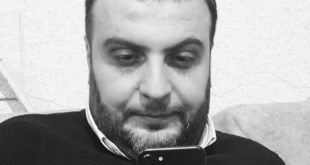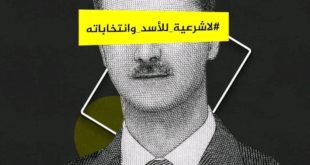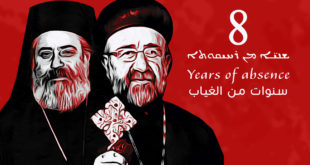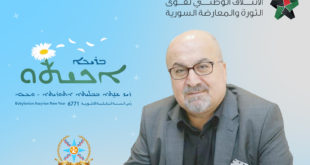26-10-2021
Geneva, Switzerland (AINA) — The sixth round of the UN-led constitutional meetings between the delegations of the Syrian Government and Syrian Opposition and civil society representatives belonging to NGOs started Monday, October 18 in Geneva. The meetings are chaired by the UN Special Envoy Geir O. Pederson, with co-chairs from the Syrian Government and Opposition.
The aim of the meetings is to draft a new Syrian constitution.
International observers and regional powers expressed support and placed hopes that this session of the drafting-body of the Constitutional Committee would finally start real work, as the fifth round held in January remained focused on procedural issues and made insufficient progress (AINA 2021-02-24).
In a statement published ahead of the meeting on Sunday October 17, Mr. Pedersen said he “had the pleasure to meet already with the Co-Chair nominated by the government and the Co-Chair nominated by the opposition,” and that he also “met with the so-called Middle Third or civil society 15 members. All very good meetings.”
Prior the first day sessions, the delegations submitted their proposals to the U.N. concerning the basic principles of a new constitution that will determine the future of Syria.
The Assyrian Democratic Organization (ADO) was a founding member of the Syrian National Council and part of the opposition, the Syrian National Coalition, since its inception. As such, it is part of the larger constitutional opposition delegation to the UN. Gabriel Moushe, an executive member of the ADO who is responsible for external political relations, attended the conference.
Mr. Moushe headed the ADO from 2009 to 2018. He was arrested in Qamishly on December 2013 by the Syrian Secret Police and imprisoned in Damascus for alleged terrorism. Although ADO did not take up arms and only protested peacefully in the streets, the Syrian regime considered Gabriel Moushe an inconvenient opposition figure whom they wanted to intimidate. He was finally released in June 2016.
The following Interview was conducted with Mr. Moshe in Geneva.
Abdulmesih BarAbraham (AB): Welcome in Geneva. First, you are currently living in Qamishli, known as Syrian Jezira in northeastern Syria. How is the security situation there?
Gabriel Moushe (GM): Thank you. The security situation in the Qamishli region is relatively stable compared to the other Syrian regions, but it is fragile for fears of a renewed military conflict between the Syrian Democratic Forces (SDF) with Turkey and its allied militia, which could lead to a new cycle of violence, especially in areas where they are facing each other directly, like the western countryside of Tel Tamer — unless the Russians and the Americans, who have agreements with Turkey stipulating SDF to be kept 30 km away from the Turkish border, can defuse the provocations
AB: How would you asses the health, humanitarian, and economical situation in the country? How is life of the population impacted in the region?
GM: The humanitarian situation is mainly impacted by the economic situation, as the vast majority of the Syrian population suffer from deteriorating economic conditions, high commodity prices, weak purchasing power due to the depreciation of the Syrian pound, and low wages of workers that averages about $20 per month, 20 000 SP (Syrian Pound); this is merely enough for a family to make living from for a few days. In comparison, a family of five people needs an estimated at 1,300,000 Syrian Pounds per month to secure basic needs.
This situation is exacerbated by the long hours of power shortages and the lack of fuel and gas. Most of the people depend on the aid provided by international humanitarian organizations, as well as Assyrian expatriates living in the countries of diaspora and supporting their families.
AB: Earlier you attended the UN-led constitutional meetings. According to a statement by the UN Special Envoy for Syria, Geir O. Pederson, there has been agreement on the meeting procedures between Syria’s Opposition and Syrian Government representatives, which seemed to be the obstacle for earlier gathering in Geneva. Did the three blocks ultimately accepted each other, and real constitutional work can start?
GM: During the current round of meetings of the Constitutional Committee’s drafting group, which began its work in Geneva on October 18, there was an agreement on a new process to speed the momentum, which required first holding a meeting of the two co-chairs of the Constitutional Committee with Special Envoy Mr. Geir Pedersen, in order to prepare for the first round of the meeting. It was also agreed that delegations would submit written proposals for constitutional context of principles for discussion.
AB: As understood, there exists a drafting sub-group or body of 45 people equally appointed from the three blocks of the larger Constitutional Committee of 150 people, the latter assembled of delegates from the Syrian Opposition, Syrian Government and civic society representatives. Would you briefly describe the course of the meetings?
GM: The course of the meetings in this round is characterized as calm, unlike the previous rounds, which witnessed a lot of quarrels and provocations, orchestrated by the government delegation because it was not serious [about the meetings] and did not believe in the political process as a solution for Syria, including negotiation on the constitution. But because of Russian pressure on the Syrian Government’s delegation, in this meeting some discussions on constitutional issues took place. The atmosphere is not without occasional attempts to obstruct and raise issues unrelated to the constitution by government’s delegation.
AB: What are the key issues under focus in the recent sessions? Are we talking about an amendment, change of the current Syrian constitution or is the aim to draft a totally new constitution?
GM: The delegations submitted four papers containing formulations of constitutional principles that were discussed by all members of the drafting-committee during the week. Where the government delegation presented a proposal entitled “The Sovereignty, Independence and Unity of the Syrian Arab Republic”, the delegation of the opposition presented a proposal entitled “Army, Armed Forces, Security and Intelligence”; the civil society delegation close to the opposition presented a paper entitled “The Rule of Law”.
On the fourth day, the government delegation presented a second proposal entitled “Terrorism and Extremism”. On the fifth day, all proposals and amendments were discussed. Of course, the order and number of proposals in the next round of meetings — not scheduled yet – will be maintained, as the opposition delegation will present two proposals, while the government delegation can present one. In the current rounds of discussion, it was noted that there is a significant difference between the vision of the opposition and the government, and despite the efforts of some international parties to spread an atmosphere of optimism, it is still too early to say “that the work has actually begun on the constitution that the Syrians people aspire to.”
UN Resolution 2254 stipulates the drafting of a new constitution as it is adhered to by the Syrian Opposition delegation, and not a constitutional process to amend the current Syrian Constitution. According to the mandate of the Constitutional Committee, the purpose of constitutional reform is to implement Resolution 2254. Consequently, amending the Syrian Constitution of 2012 is not on the agenda, although the Constitutional Committee can benefit from previous Syrian constitutional models with the aim of drafting a new one.
AB: What is the role of the key players with military presence in the country — USA, Russia, Turkey, and Iran? Are they just observers?
GM: The governments of Russia, the United States, the European Union and Turkey have shown their support for both the Constitutional Committee and for the efforts of the UN Special Envoy. These countries sent high-level envoys to accompany the work of this sixth session in Geneva, such as Russia for instance, where the special envoy of the Russian President met with the three delegations and urged them to continue and deal positively with the constitutional process. Representatives of the United States, the European Union and Britain also met with the opposition delegation.
AB: What are the Assyrian Democratic Organization’s demands for a future Syrian constitution?
GM: I and my colleague, Abdelahad Astepho [1], were appointed representatives of the ADO, and as members of the (larger) Constitutional Committee by the Syrian Negotiating Committee. As you know, the meetings of the sixth round are limited to members of the [smaller] drafting-body, in which we are not represented. My presence in Geneva today is part of the Advisory Board (AINA 2021-02-24). formed by the European Center for Kurdish Studies, which includes representatives of the Kurdish National Council in Syria. Our presence in Geneva today is to keep pace with the work of the sixth round and to meet with representatives of the opposition and civil society in the Constitutional Committee, as well as to meet with representatives of countries in order to get support, mobilize and advance our demands.
The Assyrian Democratic Organization calls for building a secular democratic state that constitutionally recognizes the existence and national identity of the Assyrians as Syriac-Aramaic speaking people in Syria, as well as other nationalities, in order to guarantees all their national rights within the framework of the unity of Syria, a decentralized state that respects human rights, and is based on equal citizenship and full partnership among Syrians regardless of race, religion or gender.
AB: As observed, there are other Christians — up to a dozen individuals – in the larger constitutional body, but ADO represents the Assyrians as an ethnic and indigenous group of the country. Are the various Assyrian churches represented in the constitutional body?
GM: It is true that the delegation of ADO represent a national cause specific to the Syriac-Aramaic speaking Assyrians, and there are other Christian members distributed among the three delegations, but they do not represent a national or ethnic cause other than Syrian, nor are they [dedicated] representatives of their churches.
AB: What kind of progress was expected from this sixth session and what have been actually achieved during this meetings?
GM: In this round, for the first time, we have moved from the stage of general discussions and exchange of accusations into the process of addressing constitutional contents and presenting a written framework pertinent to a new constitution. This meeting may not have produced expected outcomes, but this does not preclude the presentation of other constitutional contents and principles in the upcoming rounds. To achieve serious progress, we need time to converge views and build confidence building measures, and this cannot be achieved without international pressure and support.
AB: What are the points that are agreed upon? Is there any plan concerning further negotiations?
GM: Most likely, it will be agreed to hold two new drafting-committee rounds, before the end of 2021; we shall wait and see how things are progressing before we can judge whether there will be a move forward or not.
AB: Recently there have been reports that Assyrian villages in Khabur are experiencing repeated Turkish bombings. How is the situation there now?
GM: Some of the villages of Khabur valley, located west of Tel Tamar and close to the front lines between the Turkish-backed factions and the SDF, have been affected by the shelling, resulting from provocations from both sides, where the SDF are stationed in some of our people’s villages in the valley.
The intensity of the bombardment escalated in the past two months, forcing the displacement of the rest of our people from these villages. The ADO condemned these attacks and called on all parties to safeguard civilians and not to turn our people’s villages into a battle field. Recently, there have been attempts by Russia and USA to calm the situation in this region and other areas, in order to stop the escalation and the military build-up between forces loyal to Turkey and the SDF [2], which Turkey accuses of being an extension of the Kurdistan Workers Party and a terrorist organization.
AB: Reports about the authoritarian actions of the Kurdish-led Self-Administration surface repeatedly. Two people were arrested very recently, you have twice been denied travel to Iraq. How are ADO relations with the Kurdish administration and how do the majority of Assyrians in the regions perceive it?
GM: The ADO deals with the Autonomous Administration as a de-facto authority. Unfortunately, this administration, in order to impose its control and hegemony, restricts public and political freedom, and uses repressive methods against its opponents, despite the existence of our parties [3] allied with it, the credibility of the administration is weak among our Assyrian people and other groups, as well as, the Kurds. In fact, ADO, through its peaceful approach, does not remain silent about these practices. On the contrary, it exposes them to the public and exerts political and media pressures to stop these practices.
[1] Abdelahad Astepho, a representative of the Assyrian Democratic Organization, is Vice President the Syrian Opposition groups. [2] The People’s Protection Units (Yekîneyên Parastina Gel, or YPG) is the armed wing of the Democratic Union Party (Partiya Yekîtiya Demokrat, or PYD), which Turkey accuses of being an extension of the Kurdistan Workers Party (PKK). The Syrian Democratic Forces (SDF) are by setup as a multi-ethnic, multi-religious force, though dominated by Kurds. [3] Syriac Union Party (SUP) and Assyrian Democratic Party (ADP)
Read it on AINA
http://www.aina.org/news/20211025230707.htm?fbclid=IwY2xjawFyYkhleHRuA2FlbQIxMQABHSMzC8JLewubm-beQI_pXLjUJRQZWyj8ZETSQysfoEQYf6tTpKUkLT8xsg_aem_Jle46J6S05RNzAn-TQewhg
 Assyrian Democratic Organization ADO
Assyrian Democratic Organization ADO







